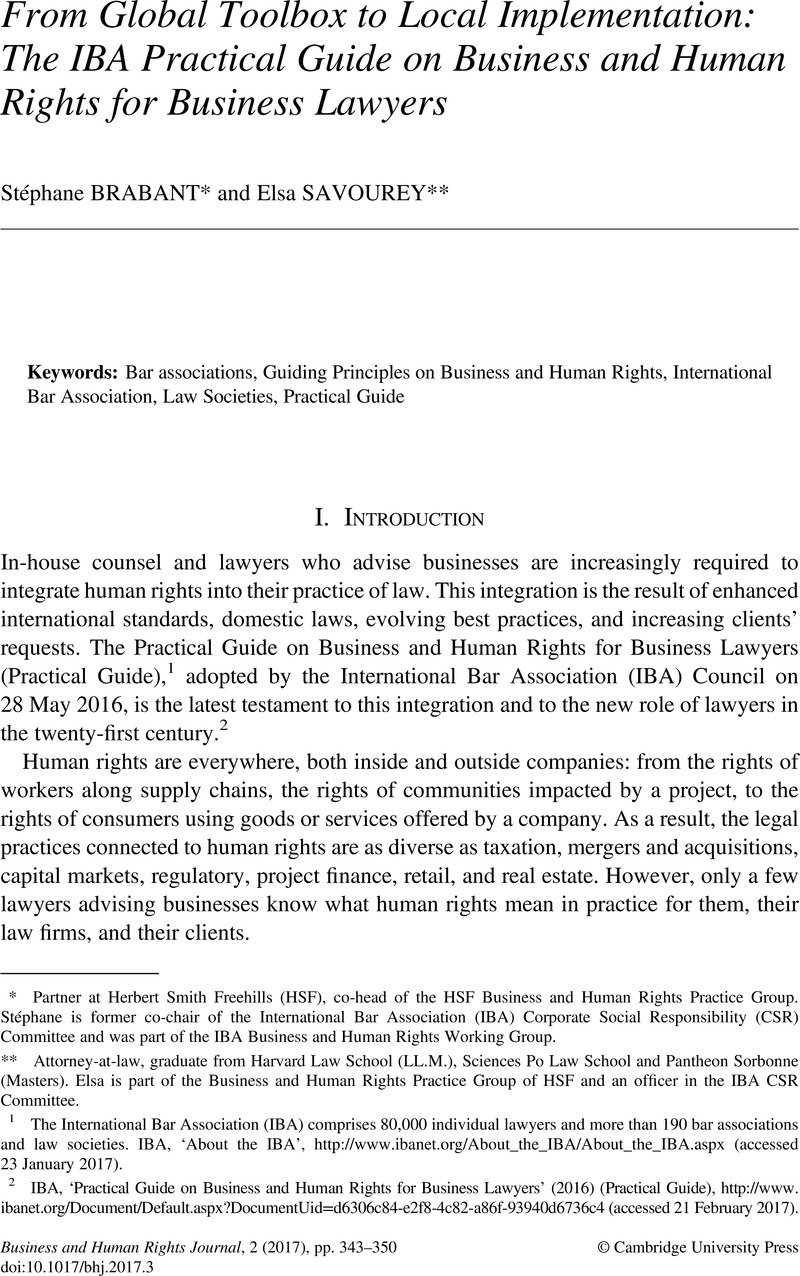No CrossRef data available.
Article contents
From Global Toolbox to Local Implementation: The IBA Practical Guide on Business and Human Rights for Business Lawyers
Published online by Cambridge University Press: 17 April 2017
Abstract

Keywords
- Type
- Developments in the Field
- Information
- Copyright
- Copyright © Cambridge University Press
Footnotes
Partner at Herbert Smith Freehills (HSF), co-head of the HSF Business and Human Rights Practice Group. Stéphane is former co-chair of the International Bar Association (IBA) Corporate Social Responsibility (CSR) Committee and was part of the IBA Business and Human Rights Working Group.
Attorney-at-law, graduate from Harvard Law School (LL.M.), Sciences Po Law School and Pantheon Sorbonne (Masters). Elsa is part of the Business and Human Rights Practice Group of HSF and an officer in the IBA CSR Committee.
References
1 The International Bar Association (IBA) comprises 80,000 individual lawyers and more than 190 bar associations and law societies. IBA, ‘About the IBA’, http://www.ibanet.org/About_the_IBA/About_the_IBA.aspx (accessed 23 January 2017).
2 IBA, ‘Practical Guide on Business and Human Rights for Business Lawyers’ (2016) (Practical Guide), http://www.ibanet.org/Document/Default.aspx?DocumentUid=d6306c84-e2f8-4c82-a86f-93940d6736c4 (accessed 21 February 2017).
3 Practical Guide, ibid, 7.
4 Human Rights Council, ‘Guiding Principles on Business and Human Rights: Implementing the United Nations “Protect, Respect and Remedy” Framework’, A/HRC/17/31 (21 March 2011) (UNGPs).
5 International Bar Association Constitution (as updated on 28 May 2016), art 1.
6 Practical Guide, note 2, 7. See also IBA, ‘Business and Human Rights Guidance for Bar Associations’ (2015) (IBA Guidance) 1, http://www.ibanet.org/Document/Default.aspx?DocumentUid=70D3F1B6-33F8-41AD-866E-4928DAD6E696 (accessed 2 March 2017).
7 For examples, see Nolan, Justine, ‘Business and Human Rights in Context’ in Dorothée Baumann-Pauly and Justine Nolan (eds.), Business and Human Rights, From Principles to Practice (London: Routledge 2016) 2–11 Google Scholar.
8 Practical Guide, note 2, 22.
9 Ibid.
10 See, e.g., Modern Slavery Act 2015 (UK), c. 30, § 54, Directive 2014/95/EU of 22 October 2014 amending Directive 2013/34/EU as regards disclosure of non-financial and diversity information (L330/1), loi relative au devoir de vigilance des sociétés mères et des entreprises donneuses d’ordre 2017 (France).
11 Practical Guide, note 2, 23.
12 For more information on this framework, see, e.g., Nolan, Justine, ‘Mapping the Movement: The Business and Human Rights Regulatory Framework’ in Baumann-Pauly and Nolan (eds.), note 7, 32–51 Google Scholar.
13 Practical Guide, note 2, 7.
14 Ibid.
15 See, e.g., Copper Mesa Mining Corporation v The Republic of Ecuador, PCA case No. 2012-2 (2016) (finding the expropriation of Mesa Mining Corporation from two mining concessions in Ecuador unlawful but reducing by 30% the indemnity awarded to the claimant for one of the concessions due to its contribution to its own prejudice since the acts of its agents in Ecuador, using premeditative violence against the local population, had reduced its chances of turning this concession into a commercial success).
16 Practical Guide, note 2, 36.
17 Ibid, 30.
18 Ibid, 23–26 (lawyers’ advice can help clients to respect human rights in relation to corporate governance and enterprise risk management, reporting, disputes, contracts and agreements, development and implementation of human rights standards). See also Ruggie, John G. and Sherman III, John F., ‘Adding Human Rights Punch to the New Lex Mercatoria: The Impact of the UN Guiding Principles on Business and Human Rights on Commercial Legal Practice’ (2015) 6 Journal of International Dispute Settlement 445 CrossRefGoogle Scholar.
19 Practical Guide, note 2, 32–33.
20 Ibid, 34–37 (including human rights policy commitments and enforcements of such commitments, internal human rights impact assessments).
21 Ibid, 38.
22 Ibid, 38 (‘providing incorrect legal advice or services to clients may result in claims by clients against their lawyers. This could encompass claims arising from advice or services regarding UNGPs or their implementation.’).
23 Ibid.
24 Ibid, 28.
25 Ibid, 29.
26 Consultations were conducted with local lawyers, bar associations and law societies, including the Spanish National Bar, the Law Society of Namibia, and the Costa Rican Bar Association. Ibid, 10–11.
27 Ibid, 9.
28 IBA Guidance, note 6.
29 Practical Guide, note 2, 27.
30 UNGPs, note 3, Principle 13.
31 IBA Business and Human Rights Working Group and IBA Legal Policy and Research Unit, ‘Reference Annex to the IBA Practical Guide on Business and Human Rights for Business lawyers’, 3, http://www.ibanet.org/Document/Default.aspx?DocumentUid=82b3381d-a27c-4ef8-b869-39d0aa2fcb18 (accessed 21 February 2017) (the Annex is, however, not considered as IBA policy).
32 Conseil de l’Ordre du Barreau de Paris, ‘Résolution portant sur la Business and Human Rights’ (8 September 2015), http://www.avocatparis.org/mon-metier-davocat/publications-du-conseil/seance-du-conseil-de-lordre-du-mardi-8-septembre-2015 (accessed 21 February 2017); American Bar Association, ‘Resolution 109’ (February 2012), http://www.americanbar.org/content/dam/aba/administrative/human_rights/hod_midyear_109.authcheckdam.pdf (accessed 21 February 2017). Some bar associations and law societies mention the UNGPs in more general guidance documents on CSR, e.g., Council of Bars and Law Societies of Europe, ‘Corporate Social Responsibility and the Legal profession: Guidance II’ (2014), http://www.ccbe.eu/fileadmin/user_upload/NTCdocument/EN_CSR_Guidelinespd1_1395048991.pdf (accessed 21 February 2017).
33 The Law Society of England and Wales, ‘Business and Human Rights: A Practical Guide’ (2016), 3, http://www.lawsociety.org.uk/support-services/documents/business-and-human-rights-a-practical-guide/ (accessed 21 February 2017).
34 IBA Guidance, note 6, art 9.


